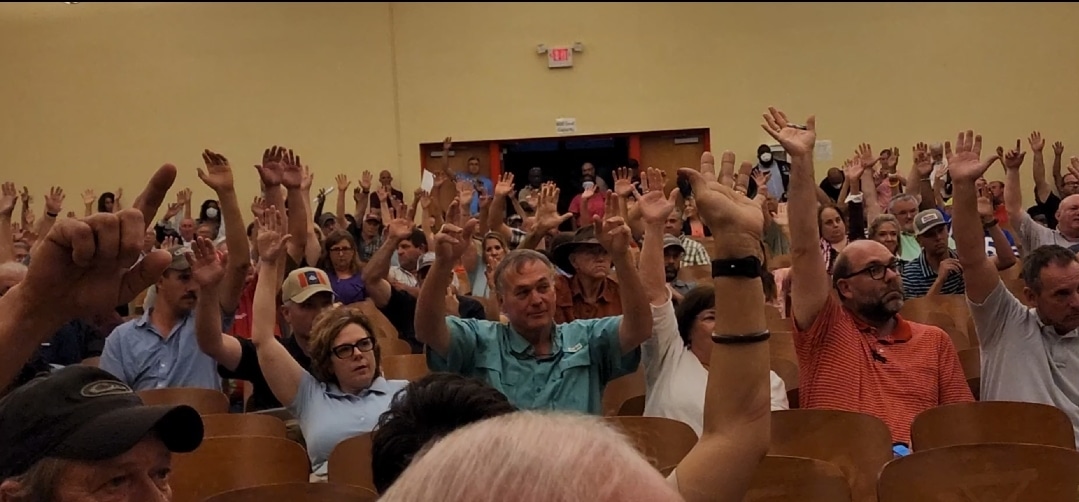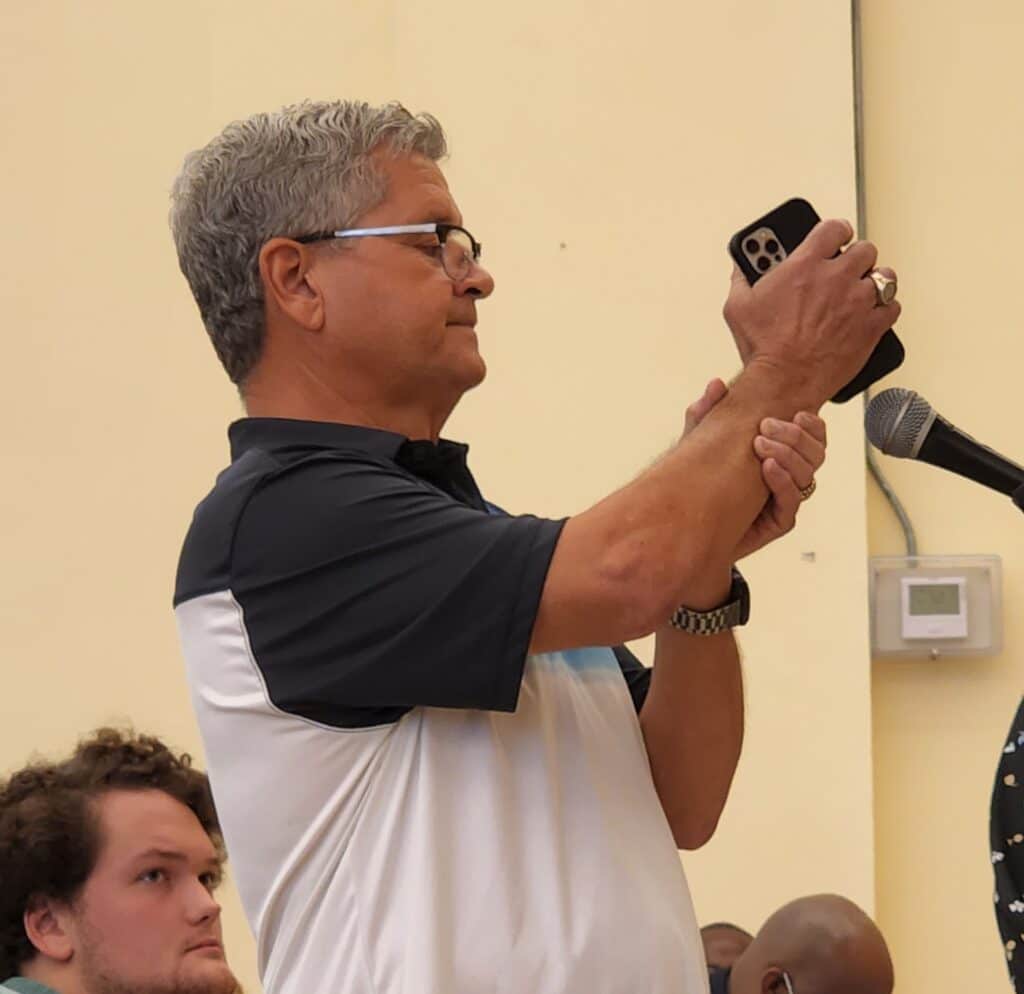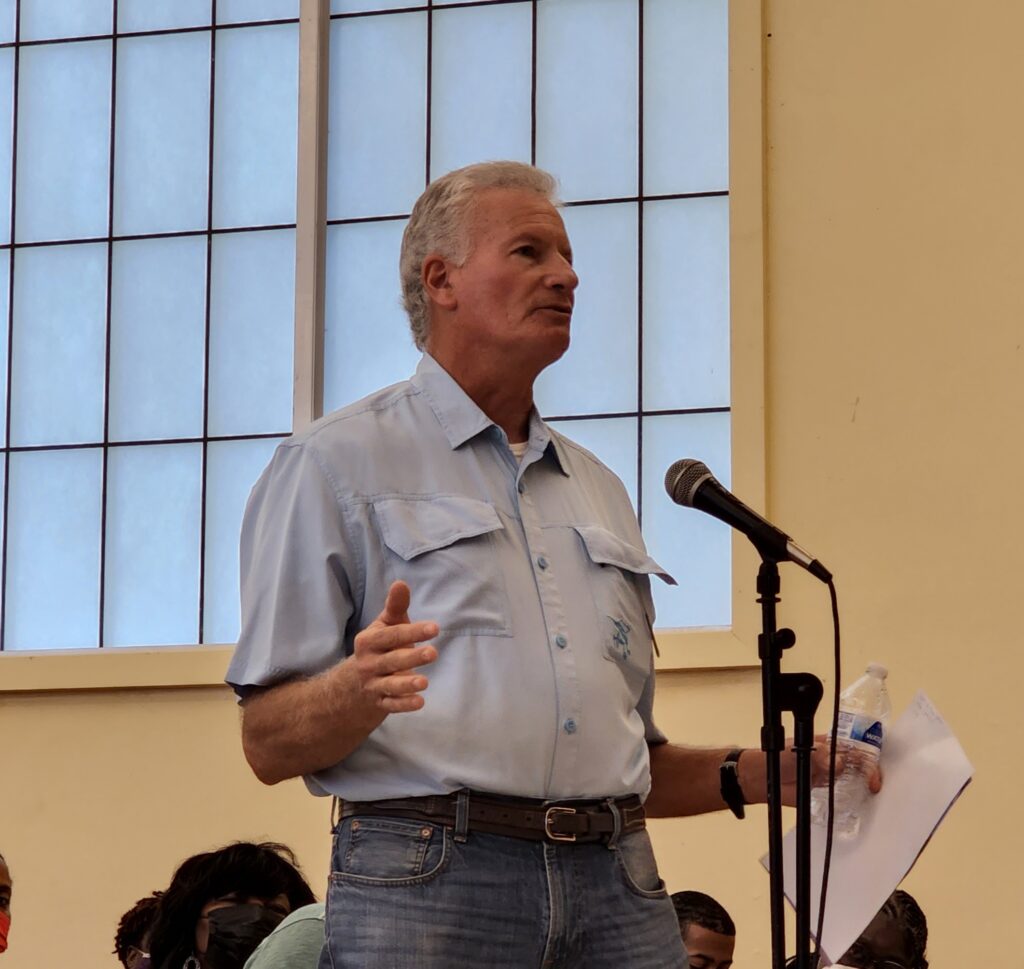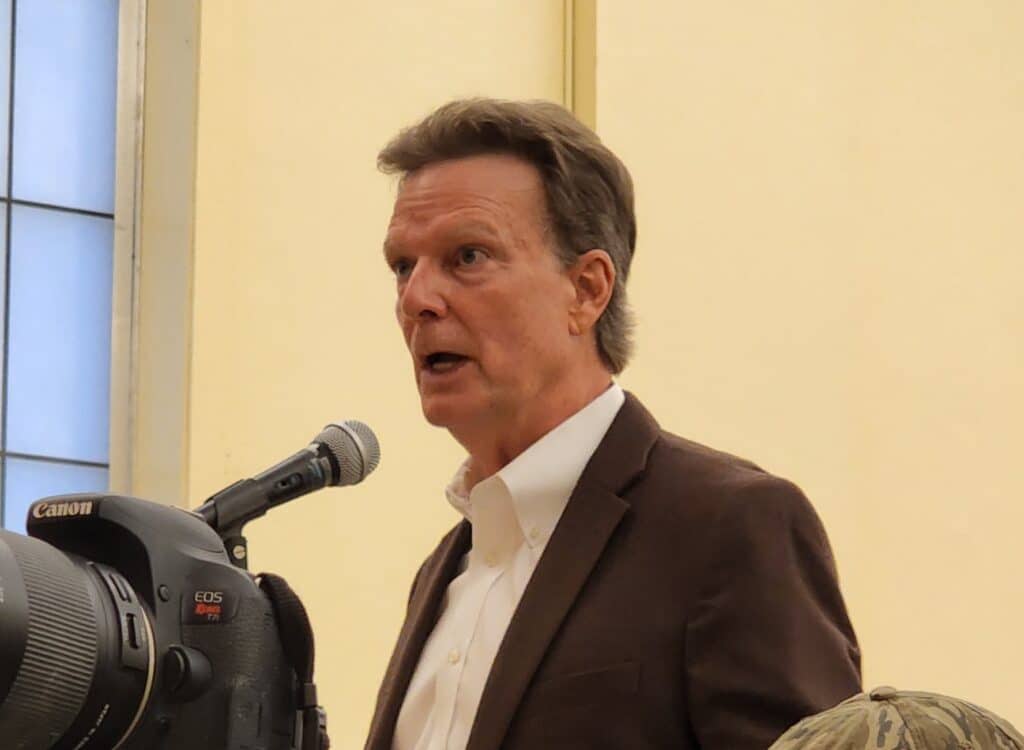National
Thompson and Wicker face angry flood victims
“We’ve been working on this for decades. That is not acceptable. How many more decades is this going to take?” – Stan Thibodeaux, Eagle Lake

A crowd of over 300 people showed up to face Bennie Thompson, Roger Wicker and a host of government officials about flood solutions in the South Delta.
The meeting was organized by Senator Wicker’s office and was touted by local attorney and activist, Ty Pinkins.
Flooding in 2019 put hundreds of thousands of acres of land underwater and displaced thousands of residents. The flood caused massive damage to fauna and flora in the South Delta, which is still suffering from the damage. Residents in the affected areas blame the government, and specifically the Army Corp of Engineers, for the flooding. The Corp worked for decades to create channels, levees and control structures to direct water in the South Delta to control points, including Steele Bayou. The final part of the plan after all the land work was to install pumps near Steel Bayou to pump flood water into the Yazoo River that would then run into the Mississippi River.
The pumps were never installed.
As the flood of 2019 intensified, a group of citizens came together and formed the “Finish the Pumps” group to call awareness of the need for the pumps and to complete the water management project. They used the flood as an example of the damage done by the created channels, levees and control structures that caused, as they call it, a “man-made” flood.

Army Corp’s Michael Connors, CEQ’s Brenda Mallory, Congressman Bennie Thompson, Senator Cindy Hyde-Smith, and Senator Roger Wicker at a meeting with local officials earlier in the day.
Earlier in the day, local elected officials met with the representatives from Washington. Wednesday’s evening’s meeting in Rolling Fork is the latest step in the 8-decade-long effort to control water flow in the South Delta.
The Location
The auditorium of the South Delta High School was mostly full with an estimated 300 people in attendance. The crowd was diverse with a strong showing from Eagle Lake and the surrounding areas.
Out front, the “Finish the Pumps” bull was placed at the main entrance. On the side of the building catfish, coleslaw and french fries were available. About 30 minutes prior to the start of the meeting a large number of people started to filter into the auditorium. There was also a large security presence inside the auditorium.
At 5:19 p.m. the elected officials and invited dignitaries from the government entered the room from the side door of the auditorium. They met with friends and supporters glad-handing and making small talk. They made their way to the stage and the meeting began promptly at 5:30 p.m.
Opening remarks
After a brief hello from a local official, Bennie Thompson was the first guest to speak. “I’m happy to join Senator Wicker in bringing these people from out of town here to talk about it and looking towards the long-term solution. Short term and long term for flood control in the South Delta.”
Senator Wicker followed and was warmly greeted by the crowd. “We have the team on this stage that will be meeting to come up with the plans.”
That team included Brenda Mallory from the Council on Economic Quality, “I think part of our challenge is to think about how to be realistic about the nature of the flooding that is occurring now and will continue. And to come up with ways to have creative solutions for addressing those problems. We want an enduring solution. We recognize that what is going on in this community is unacceptable and not sustainable.”
Radhika Fox, the Assistant Administrator for Water for the EPA, spoke next and was followed by Michael Connors, Assistant Secretary of the Army for Civil Works, who oversees the Army Corp of Engineers. “We’re here to get your views. It’s an incredibly important part of the process to hear those.”
Shannon Estenoz, Assistant Secretary of the US Dept of the Interior for fish and wildlife and parks, said, “We’re here to listen.” Estenoz went on to say, “We are committed to finding an implementable, durable solution to these problems. We know that the suffering that is happening in the Yazoo backwater is untenable, unsustainable, unacceptable. We are committed to finding a solution to that. We want that to be a solution that works for all communities.”
Victoria Salinas, Department of Homeland Security’s (DHS) Federal Emergency Management Agency (FEMA) Associate Administrator for Resilience was also on the stage.
The Listening
Next, the community spoke to the assembled guest from the Federal Government.
Chuck’s Dairy Bar owner, Tracy Harden spoke first and explained the impact of the flooding on her business and family. “Be in mind, please, that is not just something where we can be given money to move away. It takes a lot more. And what that more is, is going to be those pumps. Those pumps are what is going to sustain my business, the farmer’s business.” Harden went on to say, “We are here to stay.” Harden expressed her love for the community and how awesome it was to see this many community members at the meeting. “If you look around you see Black, you see White, you see Hispanic. You see all of us here together. I don’t want anyone to look at us and think of us as ‘us over here’ or ‘us over there’. Because when our town floods there is nothing like the South Delta that is going to come through and take care of you.”
Harden’s comments were met with spontaneous and sustained applause.
Ty Pinkins spoke next, “I’m a veteran, I’m a lawyer and I’m an author. But more important than all of that, I am a son of the Mississippi Delta born right here in Sharkey County.” Pinkins, who touted the meeting and passed out hundreds of flyers to those in attendance talked about the disparity of federal help to his community. “Millions and millions of dollars are being poured into communities around us and we keep getting a pump shoved in our face. And that’s not fair because I can bet you none of them suffer from flooding as much as Sharkey and Issaqueena counties.” Pinkins went on to challenge the assembled dignitaries, “Our job is not to provide you with the solutions. Your job is to provide us with the solutions. That is why we pay you. We pay you to help us.”
Ann Dahl from Eagle Lake spoke next. “You guys have no idea what it is like to live through a seven-month flood. We didn’t decide in the beginning that we were going to withstand a flood that was going to reach 98 feet. The crest of the river and the backwater changed, like, every two weeks, we were hit with a new crest, a new target.” Dahl went on to complain that during the flood event there was no national media attention. “We had Black Hawk helicopters flying over all the time, but the media just completely ignored us. We were on our own. We endured that for 7 months. Most of us here in this room probably have PTSD because of it. Even what we’ve experienced the last week with the rain we’ve had causes us all to literally go sit in our closets and hide.”
Dahl also addressed the desire of some to use easement programs. “These easement programs have backlogs right now where they can only take one or two applications a year. If all of the flooded farmland decided they wanted to put their land in these programs, it would cost 917 million dollars in this program. And it would also take 70 years.”
Dozens of people spoke
One man spoke about enduring the floods since 1973 and now his children and grandchildren are enduring the floods. He made the point to quit the divisive language and help one another. “There’s no place like home.” Another man said he felt like the government didn’t care about him, “We’re expendable.” He also talked about wildlife, “Human life is more important than animal life.” Another man spoke and played an audio clip he made during the floods. You can hear birds singing in the background as he played it, “It’s Saturday, May 18, another record-setting flood day. Water is coming across the road, this is where it gets me.”
Another citizen asked why we don’t have the information to understand what’s going on.
Stan Thibodeaux runs a fishing guide service at Eagle Lake and said, “We’ve been working on this for decades. That is not acceptable. How many more decades is this going to take?” Thunderous applause and shouts cut him off before he could resume speaking. “Different wetland species require wet and dry conditions at different times of their life cycle. I’m thinking 6, 6 and a half months of underwater is not their life cycle time to be wet and dry.” Thibodeaux went on to address a complaint that a pump won’t, “…be adequate or sufficient to pump the water out. To me, you know, I’d probably put 2 or 3 then if that were the case.” His comment was met with loud laughter, broad smiles and applause.
A 3rd generation farmer from the county spoke about how the pumps would allow him to farm. A 20-year veteran of the oil fields talked about the long-term impact on wildlife. “Those pumps work everywhere else, why won’t they work here?” Hank Berdine with the Levee Board addressed several issues but specifically the impact on wildlife and plants.
An expert speaks
Ken Klaus from Eagle Lake spoke about what he called misinformation in the flyers passed out at the meeting. Specifically, he spoke about how the information minimized the impact of pumping water off 17% of the land. “In that 17% of land that would have been prevented from flooding during the 2019 flood, you would have had almost all of your major roads, most all of the houses, most of the farmland. It would have provided sanctuary for your wildlife. All of that would have happened.”
Klaus went on to point out that the veto of the pumps in 2008 was based on what they thought was going to happen. “The 2019 flood was a demonstration of what the no-pumps plan results in. Any real scientist, any real engineer will always take a field test over theory.”
James McKinney, a retiree from the coastal hydraulics lab in Vicksburg said, “I’ve spent a career looking at water levels. In January of 2019, the backwater was extremely high. We had an 8-inch rain shortly thereafter.” McKinney went on to say, “I moved out of my house at Eagle Lake on February 21st before the water came over 465. What happened was the river came up and stayed up. It was a very slow process, rain after rain after rain as the water constantly came up through the backwater. If you would have started the pump in January and kept the pumps going continuously, the water would have never got where it got to.”
Eddie Hatcher, District 1 Supervisor in Issaqueena County addressed the assembled dignitaries. “The pumps are not going to stop the flood, but the pumps will keep the water down to where people can go to their homes. I have 86 miles of road in my district, 86 miles. And out of that 86 miles in the flood of 2019, if you added every little piece from here to that wall or whatever, there might have been a mile, a mile and a half that was not underwater. Then they got the government that was going to come in and save the day. They gonna fix everything back new. That was 2019 folks, I ain’t got nothin’ from the government!” His comment was met with applause but he spoke over it saying, “We patch it. We do the best we can with what we got. Is that fair? No.”
Hatcher then made this comment, “If you’ve got a bathtub, you don’t let it fill up and run over on the floor before you pull the plug, do ya? No! You pull the plug!” Hatcher was referencing a familiar analogy used by people in the South Delta to explain the water basin and work done by the Corp of Engineers over several decades to move the water in the Delta to the Steele Bayou control structure, the plug. “The farmers, they farm and they hire people. And then when they hire people they spend money in our towns. That’s how things work. It starts up here and trickles down. So y’all need to go tricklin’ some money.”
Stormy Deere spoke about how they boated from the road to her house. “2019 was a man-made flood, courtesy of y’all,” said Deere to a round of applause. “Keep your promises. And our elected officials should be screaming just as loud as South Delta because we’re pretty loud.” Deborah Williams spoke about the last meeting she attended about the pumps in 2019 and how many people were displaced, including her mother. “Get that team together and start pointing at people that’s going to actually come here and do some things on the ground while you guys keep your promise.”
The Audubon and the NAACP speak
Jill Mastrototaro, from Audubon Delta, read from a prepared statement that supported investing in items other than the pumps. When she finished speaking the rooms loudly booed her.
Charles Taylor, with the Mississippi NAACP spoke. “This is an issue that is personal to everyone in the room.” Taylor went on to say there is more than one solution beyond the pumps and was concerned about an equitable solution for everyone, even after the pumps are installed. “Imagine we get the pumps. There is still going to be severe flooding in this area. I wonder what a community meeting would look like after the pumps are here. I wonder if the same faces will be in the room. I wonder if it will look different. We have to ensure that this issue affects all people who have been dealing with this suffering. Been dealing with the flooding in the South Delta for decades.”
Victoria Darden Garland spoke next about her experience. Garland was featured in a Vicksburg Daily News story that called a lot of attention to the plight of flood victims. “We need help and we need a pumping station.”
Ty Pinkins spoke once again to address some of the issues brought up at the meeting. “There are people who would benefit from other solutions.”
Roy Rucker, who identified himself as a government-trained data scientist, retired. “There is a ton of misinformation and disinformation that has been going for years. And that disinformation and misinformation, that I have petabytes of, has caused all kinds of ruckus in environments like this.” Rucker suggests the solution should involve more than pumps. “What needs to happen is all of the bureaucratic misinformation nonsense that’s been keeping this place down for years, it needs to disappear.” Rucker declared he was a vegan and that he loves animals, but, “The thing that I don’t want to see die most are the people here in this room.”
A local business owner spoke about the impact of his businesses and then a retired wildlife biologist spoke about the impact on animals declaring the pumps would not hurt wildlife. Another long-time resident spoke about how his granddad saw the work done with the promise of the pumps being built.
The Sierra Club speaks
Louie Miller, Director of the Mississippi Sierra Club spoke next. When he identified himself the crowd was openly disrespectful. He declared the pumps were not the solution and that the information on the pumps is inaccurate and ever-changing. Miller said the effort to install the pumps was done by what he called “Ag interests.” The crowd booed Miller but he continued to speak to the panel.
Petesy Smith from Vicksburg then addressed the panel talking about her family and friends who worked during the floods in 1927, 1973, and 2019. She also addressed the prior speaker from the Sierra Club, saying, “You think the Sierra Club and the Audubon Society are the environmentalists? The farmers out here are the best environmentalist in the world.” Smith spoke over the thunderous applause. “How in the hell do you think that they would not do the best they can for their properties?”
Smith then went to declare, “I’m pissed off!”
The crowd loved it. “Y’all sit up there in your glass-covered offices in Washington DC. You don’t live down here, you don’t work down here. You live in Jackson and Bolton (pointing out Bennie Thompson). Y’all don’t come in here to see what’s going on.” Smith finished with, “Get off your asses and do something.”
Hank Berdine spoke again and challenged Miller from the Sierra Club, “Was he here during the 2019 flood? Were you down here?”
The Mayor of Anguilla spoke briefly about the impact of the flood and a local spoke about their experience. A local then spoke and he asked the crowd if they were in favor of the pumping project to raise their hand, and almost the entire room did. He then asked those opposed to raise their hand and almost no one did.
The last speaker recited a brief poem that brought laughter and the meeting was closed.
The crowd left without incident.
See a typo? Report it here.













